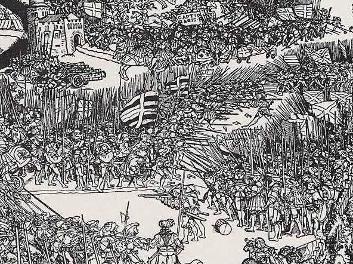THE BLACK BAND
THE RENEGADE GERMANS WHO FOUGHT FOR FRANCE

The Black Band at the Battle of Pavia [1525]
In 1488 the Holy Roman Emperor Maximilian I recruited an army of landsknecht mercenaries to crush a peasant rebellion in the Low Countries. This unit was known as the Black Guard and it fought with some distinction in conflicts across Northern Germany until its defeat at the Battle of Hemmingstedt [1500].
A similar landsknecht army, now known as the Black Band, resurfaced during The Frisian War of 1514. These men fought for the Duke of Saxony, a key ally of the Hapsburg emperors, who was trying to seize the semi-independent Duchy of Frisia.
The Black Band devastated huge swathes of the North German coast before the rebellious Frisians were conquered but at the end of the war, the landsknecht armies were unceremoniously disbanded. Unfortunately for the people of East Frisia, the men of the Black Band had to intention of returning to civilian life.
Having no other profession, the unemployed imperial mercenaries resorted to a life of brigandage and continued to pillage the Low Countries until the French King Francis I recruited them for his attack on Hapsburg Italy. As Germans who'd fought for the Hapsburg emperor during the Frisian War, the men of the Black Band had taken an oath never to fight for the enemies of The Empire but, having been abandoned by their previous employer, these men had no qualms about breaking their word.
The Black Band played a key role in the great victory Francis won at the Battle of Marignano [1515], however their actions so enraged the emperor Maximilian he sentenced the entire unit to death in absentia. Undeterred, the Black Band continued to fight for the French and in 1525 they werepart of the French army besieging the imperial garrison at Pavia.
The Battle of Pavia by 16th Century Flemish artist Ruprecht Heller
At Pavia the 5,000 renegade mercenaries were led by an English commander, Richard de la Pole the exiled Duke of Suffolk and last Prince of the House of York. De la Pole had been trying to persuade the French king to back his planned invasion of Tudor England but instead he found himself in Northern Italy.
On the 24th of February 1525, the French besiegers were attacked by an imperial army that included 12,000 German landsknechts under the legendary mercenary colonel Georg von Frundsberg. De la Pole led his men into battle confident of victory but a rash charge by the French king left the Black Band facing Frundsberg.
The ensuing melee became the final reckoning between the two sworn enemies and no quarter was asked or given. The ageing Frundsberg, realising he outnumbered the renegades by two to one, declined the traditional offer of single combat and the Black Band was hacked to pieces. According to legend not one man survived.